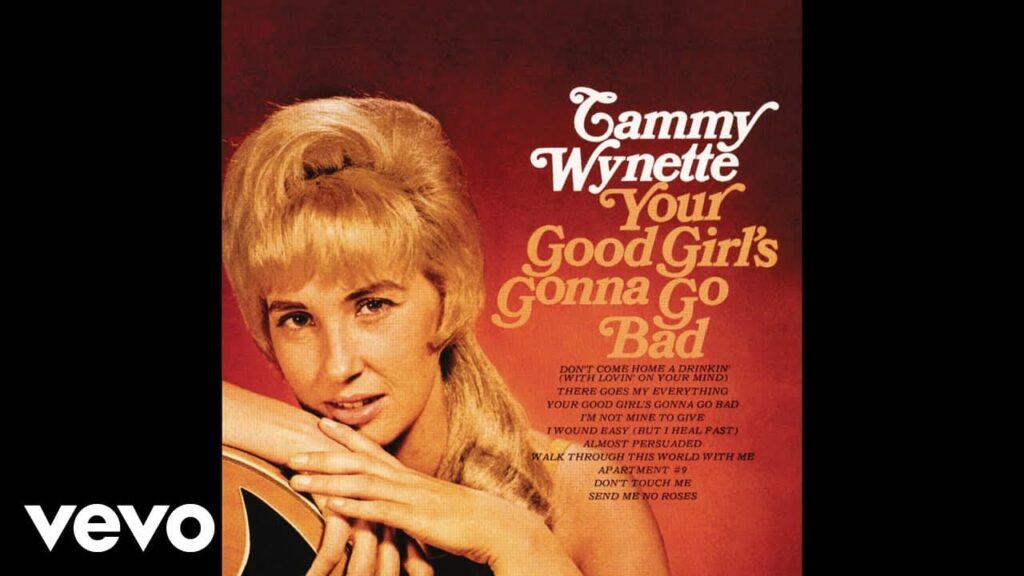
The Defiant Cry of a Woman Shedding Her Virtuous Façade: When Tammy Wynette Declared, “Your Good Girl’s Gonna Go Bad.”
“Your Good Girl’s Gonna Go Bad,” a pivotal and powerfully delivered country anthem that marked a significant shift in Tammy Wynette’s portrayal of female identity in country music, remains a defining and emotionally resonant track from her illustrious career. Released in 1967 as a single, this bold declaration of independence soared to number three on the Billboard Hot Country Singles chart, firmly establishing Wynette as a force to be reckoned with and showcasing her ability to articulate the complexities of female experience with unflinching honesty. The song was also a key track on her album of the same name, “Your Good Girl’s Gonna Go Bad,” released in 1967, which reached number seven on the Billboard Top Country Albums chart, further solidifying her connection with audiences who resonated with her raw and relatable portrayals of love, loss, and female empowerment. The song’s meaning is a defiant and resolute statement of a woman who, having seemingly adhered to the expectations of being a “good girl,” has reached a breaking point and is now declaring her intention to embrace a different, perhaps more rebellious, path, fueled by disillusionment and a desire for self-determination. It transforms a personal declaration of change into a powerful and universally relatable anthem of female agency.
Imagine the determined set of Tammy Wynette’s jaw, the unwavering conviction in her eyes, as she delivers the defiant lines of “Your Good Girl’s Gonna Go Bad.” Her unique ability to convey such raw and unvarnished emotion within a traditional country framework was her hallmark, and this song is a prime example of her power. Featured on the album that bore its assertive title, “Your Good Girl’s Gonna Go Bad,” this track wasn’t just a country hit; it was a bold statement of female empowerment in a genre often steeped in more traditional portrayals of women. The classic country arrangement, with its prominent steel guitar, driving rhythm, and Wynette’s strong and resolute vocals, creates an atmosphere of both heartbreak and burgeoning independence, perfectly complementing the song’s defiant lyrics. Her powerful delivery and the song’s universally relatable theme of a woman choosing her own path made it a groundbreaking and enduring tune for those who understood the struggle against societal expectations. The unwavering strength in her voice conveyed the depth of her resolve and the finality of her decision.
The story behind “Your Good Girl’s Gonna Go Bad” involves the songwriting talents of Glenn Sutton and Billy Sherrill, two influential figures in country music known for crafting songs that often pushed the boundaries of traditional themes and explored more complex emotional landscapes. Their collaboration resulted in a lyric that perfectly captured the pivotal moment of a woman choosing self-determination over societal expectations. For Tammy Wynette, whose own life experiences often mirrored the complexities she so powerfully conveyed in her music, the song became a perfect vehicle to showcase her ability to articulate the raw and often unspoken frustrations of women. Her interpretation imbued the lyrics with a profound sense of authenticity, making the listener truly feel the weight of her disillusionment and the strength of her resolve. The song’s success further solidified her status as a voice for women in country music, resonating deeply with audiences who found empowerment and understanding in her honest portrayals of female experience. The enduring appeal of “Your Good Girl’s Gonna Go Bad” lies in its bold declaration of female agency and its timeless message of choosing one’s own path, even when it means defying expectations.
For those of us who have ever felt the constraints of expectation, the urge to break free from prescribed roles and embrace a more authentic self, Tammy Wynette’s “Your Good Girl’s Gonna Go Bad” evokes a sense of defiant recognition and perhaps a nostalgic understanding of the courage it takes to forge one’s own path. It reminds us of those moments of pivotal change and the empowering act of choosing self-determination. Wynette’s powerful voice and the song’s resolute melody offer a moment of shared understanding, a comforting acknowledgment of the strength it takes to redefine oneself. It remains a timeless and empowering country anthem, a quintessential expression of female agency and the defiant choice to embrace a new, self-determined path.